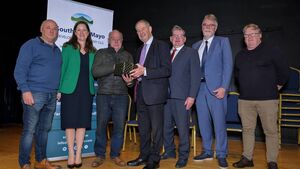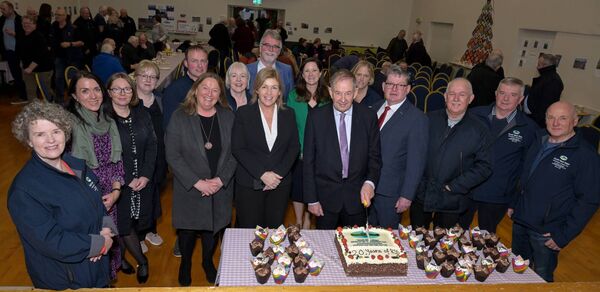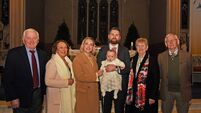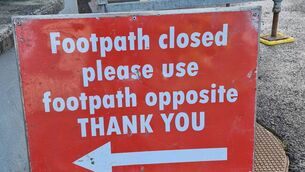Celebrating 20 years of the Rural Social Scheme

Michael Sweeney, a recently retired Rural Social Scheme participant, receives a presentation from Eamonn O’Cuiv. Picture: John Corless
South West Mayo Development Co (SWMDC) celebrated 20 years of the Rural Social Scheme (RSS) with a function in Balla Community Centre on Friday week last.
The RSS is a support programme for lower-income farmers and fishermen and women across rural Ireland. Participants work nineteen and a half hours a week for community groups, undertaking such tasks as meals-on-wheels, town and country enhancement, maintenance of community centres and facilities, cutting and marking football pitches, and administrative support for community organisations across a diverse range of services. SWMDC is one of several companies that operate the scheme.
“The company has over 200 people employed through the scheme across our area,” Sabina Trench, the SWMDC CEO, told the . “We’ve supported over 400 community groups since the scheme was launched. We have delivered over 3.5 million community hours through the scheme since its inception, and if you were to put a value on that at the minimum wage, it comes to over €30 million.”
The RSS was established in 2004 by Eamon O’Cuiv, the then Minister for Community, Rural and Gaeltacht Affairs, and Mr O’Cuiv attended the event in Balla.
“A lot of the small to medium-sized farmers came to me,” Mr O’Cuiv told the , “and said they weren't able to rear a family from their existing income. I was looking for ways to try and do something about the situation. I came up with the idea of the Rural Social Scheme with the twin aims of providing a steady weekly income for farmers and fishermen and women, and to help deal with the isolation of these occupations.
"There was a Budget upcoming and I went to Charlie McCreevy, who was the Minister for Finance at the time, and I told him about the scheme. He told me to have full details of the plan on his desk the following morning. I had put the scheme into the Fianna Fáil election manifesto in 1997, so the idea was there and its moment came. So that is the RSS, with minor modifications, as it is today.
“I think it met its objectives," Mr O’Cuiv said. “The length of time people stayed on the scheme is a testament to this. It gave them an enhanced lifestyle, and it did an awful lot for rural isolation. In olden days, there was a meitheal doing the turf or the hay or whatever. With mechanisation, a lot of these tasks are one-person operations. For a lot of people, getting out of bed and going to work with other people, was hugely important.”

In terms of the challenges facing farming and the RSS, Mr O’Cuiv said that a lot of farmers now are young farmers and they have a second job as well.
“There’s nothing wrong with that,” he said, “if they can sustain that. But the scheme has been a lifeline for a lot of farmers in rural Ireland, but we’ll have to keep changing the rules, to modify it, to keep it attractive to people who want to stay in rural Ireland, and make sure it gives the income support and the income certainty that is so important for people to have a sustainable lifestyle in rural Ireland.”
The scheme is administered by Pobal, on behalf of the Department of Social Protection. Operating bodies like SWMDC have found it difficult to recruit for the Rural Social Scheme in recent years, with vacancies all over the country. For many years, the opposite was the case, with lengthy waiting lists of people wanting to join the scheme.
The top-up payment paid to participants, on top of their qualifying social welfare payment, is quite low, making the scheme less attractive than it once was, for people to join. In addition, means testing was introduced in the last few years, forcing some participants off the scheme at a time when it was already difficult to get people to join. The operating bodies now regularly lobby the Department to relax or alter the rules to ease recruitment so that they can continue to help deliver the services the local community organisations provide.
“The Department of Social Protection is very supportive of the Rural Social Scheme,” Tony Kieran, Principal Officer at the Department of Social Protection told the at the event in Balla. “We know and we value the work that is done in communities and we've just launched, in the summertime, a review of the scheme with 19 key recommendations that we believe should make a difference to the future of the scheme. There are fewer people on Farm Assist, so there are fewer people available to come onto the scheme.
"One of the things that's recommended in the review is that two people can use the same herd number to join, which should make a difference, and also, there's a proposal to run a pilot for rural dwellers, to make 250 places available to people over-50, who live in rural communities and not involved in farming.”
Could international protection applicants be eligible?
“Ukrainians (living in Ireland) have access to our schemes, the same as any other Irish person. So somebody arriving from Ukraine who spends a year unemployed can actually join the Tús Scheme, and they will actually be invited to join the Tús Scheme as the time comes and they can also opt for community employment. They're unlikely to qualify for the Rural Social Scheme because they wouldn't have access to land unless they would qualify for the over-50 pilot scheme.”
Thomas Fitzpatrick was appointed chairperson of SWMDC last September.
“I come from the farming background,” Thomas told the . “I joined the board a few years ago. I was the IFA nominee on the board, but I don't represent the IFA on the board. I had been on an evaluation committee before that.
"The board supports the chief executive and the staff. We can improve the scheme to keep the numbers up and keep the services going.
"We need participants on the scheme and we have to try and get the best. We have to make sure we have the best facilities and the best conditions for those we can get and to make sure they're supervised and things work well.
"We need more members on the scheme. We need more participants because they do the work and we have to look at every avenue to get people, and we approach the department in every way we can to get them.”
A minute’s silence was observed at the commencement of the event in memory of former participants on the RSS who had passed. A presentation was also made to Michael Sweeney, who lives between Claremorris and Kiltimagh, who had recently retired from the scheme.




